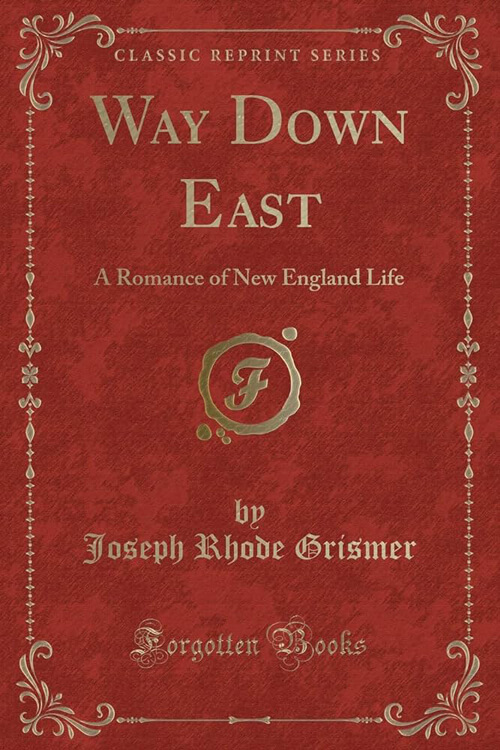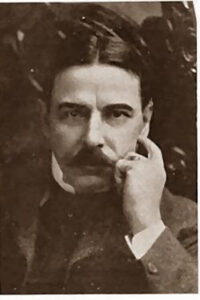
Way Down East, A Romance of New England Life
It had come at last, the day of days, for the two great American universities; Harvard and Yale were going to play their annual game of football and the railroad station of Springfield, Mass., momentarily became more and more thronged with eager partisans of both sides of the great athletic contest.
All the morning trains from New York, New Haven, Boston, and the smaller towns had been pouring their loads into Springfield. Hampden Park was a sea of eager faces. The weather was fine and the waiting for the football game only added to the enjoyment—the appetizer before the feast.
The north side of the park was a crimson-dotted mass full ten thousand strong; the south side showed the same goodly number of blue-bespeckled, and equally confident. Little ripples of applause woke along the banks as the familiar faces of old “grads” loomed up, then melted into the vast throng. These, too, were men of international reputation who had won their spurs in the great battles of life, and yet, who came back year after year, to assist by applause in these mimic battles of their Alma Mater.
But the real inspiration to the contestants were the softer, sweeter faces scattered among the more rugged ones like flowers growing among the grain—the smiles, the mantling glow of round young cheeks, the clapping of little hands—these were the things that made broken collarbones, scratched faces, and bruised limbs but so many honors to be contended for, votive offerings to be laid at the little feet of these fair ones.
Mrs. Standish Tremont’s party occupied, as usual, a prominent place on the Harvard side. She was so great a factor in the social life at Cambridge that no function could have been a complete success without the stimulus of her presence. Personally, Mrs. Standish Tremont was one of those women who never grew old; one would no more have thought of hazarding a guess about her age than one would have made a similar calculation about the Goddess of Liberty. She was perennially young, perennially good-looking, and her entertainments were above reproach. Some sour old “Grannies” in Boston, who had neither her wit, nor her health, called her Venus Anno Domino, but they were jealous and cynical and their testimony cannot be taken as reliable.
What if she had been splitting gloves applauding college games since the fathers of today’s contestants had fought and struggled for similar honors in this very field? She applauded with such vim, and she gave such delightful dinners afterward, that for the glory of old Harvard, it is to be hoped she will continue to applaud and entertain the grandsons of today’s victors, even as she had their sires.
Read or download Book
Joseph R. Grismer
Joseph Rhode Grismer (November 4, 1849 – 1922) was an American stage actor, playwright, and theatrical director and producer. He was probably best remembered for his play The New South and his revision of the Charlotte Blair Parker play Way Down East.
Early life
Joseph Rhode Grismer was born in Albany, New York, on November 4, 1849, the middle of three girls and two boys raised by Irish immigrants, Christopher and Bridget Grismer. According to later records his birth parents may have been Valentine Grismer and Adelaide Huda. In his youth, Grismer attended the Albany Boys Academy and upon graduation served with the 192nd New York Volunteer Regiment during the waning months of the American Civil War. After the war’s end, Grismer returned to Albany where at some point he found his calling as a member of the Histrionic Amateur Dramatic Club.
Life and career
Grismer made his professional stage debut in Albany around 1870 and by 1873 was playing principal roles at the Grand Opera House in Cincinnati. There Grismer appeared in hundreds of stock productions, some in support of Charlotte Cushman, Laura Keene, Edward Loomis Davenport, Edwin Adams, Lawrence Barrett, Lilian Adelaide Neilson, John Edward McCullough, Charles Albert Fechter, and Charles James Mathews.
Grismer relocated to San Francisco in 1877 where for several seasons he played leading roles at the Grand Opera House, and later the California Theatre and the Baldwin Theatre. At the latter, he met and fell in love with Phoebe Davies, a young actress from Wales who had come to prominence at the Baldwin playing Hortense in a production of Dickens’ Bleak House. They married in San Francisco on June 1, 1882, and not long afterward formed their own company of stock players known as the Grismer-Davies Organization and began playing theaters throughout California and eventually across the Western States and Provinces of North America.
During this time Grismer wrote and performed in Monte Cristo, an adaptation of the Alexandre Dumas story The Count of Monte Cristo, and Called Back from the book by Hugh Conway. Other plays performed by the Grismer-Davies Organization would include Editha’s Burglar by Frances Hodgson Burnett; The Midnight Bell, a play by Charles Hale Hoyt that would later help launch the career of Maude Adams; the Bartley Campbell play Fairfax; Lights and Shadows by Henry Leslie; the Frank Harvey Sr. play The World Against Her; The Tigress by Ramsey Morris; The Long Strike by Dion Boucicault; Lester Wallack’s Rosedale; another Boucicault play, The Streets of New York, with Grismer and Davies playing the principal roles, Tom Badger and Alida Bloodgood; Enoch Arden, from the poem by Alfred Lord Tennyson; The Wages of Sin, a morality story by Frank Harvey Sr.; and The Calthorpe Case, a melodrama by Arthur Goodrich.






